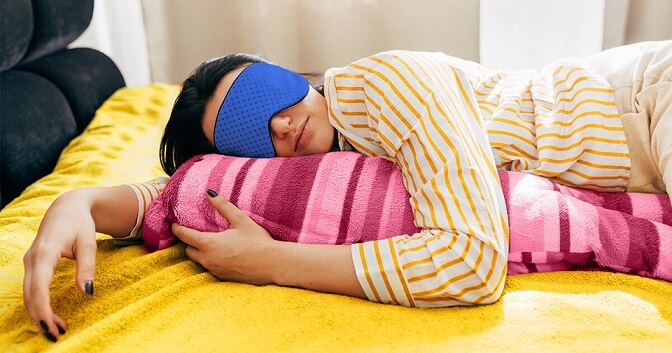
Let’s know about How many hours of sleep do I need? By the end of this post, You will know everything about some common questions answers like, Is 6 hours of sleep enough? Are 5 hours of sleep enough? How much sleep do you need by age? etc.
Quality sleep matters for a healthy life. Much scientific research has proved that quality sleep makes you physically and mentally strong.
Sleep helps to restore your body and in the morning provides a new strength to your mind to face the challenges of the day. To get all these benefits, you also need to know how much sleep do we really need?
Children need more sleep than adults for their overall body development and growth. Babies may also need up to 17 hours of sleep per night. But even 7 hours per night of sleep is sufficient for a healthy adult.
According to the National sleep foundation’s, a list of the correct sleep time duration for people of all ages is given below:
Recommendation of Sleep chart by age
| Age | Sleep Duration | |
| Newborns | 0-3 months | 14-17 hours |
| Infants | 4-11 months | 12-15 hours |
| Toddlers | 1-2 years old | 11-14 hours |
| Preschools | 3-5 years | 10-13 hours |
| School-ages | 6-13 years | 9-11 hours |
| Teens | 14-17 years | 8-10 hours |
| Young adults | 18-25 years | 7-9 hours |
| Adults | 26-64 years | 7-9 hours |
| Older adults | 65 years and older | 7-8 hours |
It is important to pay attention to one thing here that the sleep duration of people of the same age group may be different.
How many hours per night of deep sleep do you actually need?

Depending on the situation, some people get their sleep completed in just 7 hours, on the other hand, some average individuals need to sleep for 8 to 9 hours. To understand how long you really need sleep, pay attention to these questions, and follow those that are right for you:
- Do you feel healthy, productive, rested, and happy after 7 hours of sleep? Or do you feel the need for 8 or 9 hours of sleep per day?
- Do you do high intensive tasks throughout the day?
- Do you do more energy expenditure in a day?
- Are you having any daytime sleepiness?
- Do you need to be alert again and again while working throughout the day due to drowsiness?
- Do you already have any sleeping problem history?
- Have someone else noticed you having any sleeping problems?
- Do you need caffeine to work all day in the office?
- When you don’t work during the day, do you sleep more than a typical workday?
Start with the sleep duration list and ask yourself all these questions and correct the amount of sleep you need.
How the list of sleep requirements created by the National sleep foundation?
To create this special list, the National sleep foundation formed a team of 18 people from different fields of medicine and science. This particular team reviewed several valid research studies on sleep duration and health issues such as heart disease, depression, cardiovascular disease, diabetes, etc for the entire nine months.
The panel of 18 scientists studied several pieces of evidence closely to access a correct conclusion. After several rounds of discussion and voting, these teams were successful in finding how much sleep people of all ages need for a healthy lifestyle.
Other organizations such as Sleep Research Society (SRS), Organizations in Canada, and the American Academy of sleep medicine (AASM) have also published a list of sleep duration which is quite matched with the recommendations of the National sleep foundation.
Sleep stages
There are basically two types of sleep. One is REM or rapid eye movement sleep and the other is non-REM sleep. REM is consists of only 1 single stage of sleep. On the other hand, non-REM sleep is consists of 4 stages.
Stage 1
When you start feeling sleepy and began to sleep that stage is called stage 1 of non-REM sleep. In this stage you produce alpha and theta brain waves, Your breathing and heartbeat start decreasing slowly, and your muscles also begin to relax.
Stage 2
The time immediately after sleep and the time ahead of deep sleep is called Stage 2. This stage lasts around 25 minutes. In the stage your brain produces sleep spindles and brain waves spike up and down, eye movements become zero, breathing and heartbeat slow down and body temperature decreases.
Stage 3 & 4
These are the last stage of non-REM sleep which is also known as delta sleep or slow-wave. During these deepest sleep stages, your body performs some important health-restoring tasks to ready you for the next day. Such as:
- Zero eye movement.
- Breathing and heartbeat rating is very low.
- Your immune system became strong.
- The cells rise again.
- Tissue growth and repair.
- Fully your body is relaxed.
- The brain produces delta brain waves.
Stage 5:REM sleep
The time after 90 minutes of sleep is called the rapid eye movement stage. This is the first part of the dreaming stage. The first part of REM sleep lasts for about 10 minutes. The last cycle of the REM sleep stage lasts for around 60 minutes.
During this stage your breathing and heartbeat rating is increased, brain function is increased, your limb muscles become paralyzed for a while and eye movements become rapid.
Sleep tips to improve your sleep:
Nowadays the problem of sleep deprivation is increasing. There are many reasons for sleep deprivation. Lack of sleep can ruin your mental as well as physical health.
Partial sleep deprivation can also lead to higher health risks. So give priority to sleep. Practice these good sleep habits recommended by sleep experts to reduce insomnia:
Practice these habits during the day:
- Increase your activity level. Exercise in the morning rather than in the evening. Don’t do exercise in the nighttime to improve sleep quality.
- Stop taking naps during the time of day as much as possible, it can affect your night sleep. For some people, even a light sleep can spoil your night’s sleep.
- To keep your body’s circadian rhythms functioning well, be more exposed to sunlight during the day. This has a positive effect on your circadian rhythms which helps you to improve sleep cycles and fall asleep quickly.
- Obey a certain sleep schedule for healthy sleep. Keep your wake-up time and sleep time the same to improve sleep quality.
Before bedtime, practice these sleep patterns:
- Avoid every type of electronic at least half an hour before sleeping. The blue light emitting from its screens can reduce the production of the sleep hormone melatonin. It can affect your biological clock.
- Block unnecessary loud sounds around you. It can impact your sleep badly. Which can promote inadequate sleep.
- Keep your room away from artificial bright lights before sleeping. Make the room like an old cave. By doing this your brain signals you to sleep. Darkness is a big factor for deep sleep.
- Scientists recommend maintaining your bedroom temperature around 65°F (18.3°C). Which is an ideal sleeping temperature. This helps to create a sleep environment.
- Do not take nicotine, alcohol, and caffeine-containing meals at least 6 hours before bed. It stimulates your brain function and prevents you from sleeping.
- According to scientists try to maintaining a relaxing pre-bed routine. Doing so increases the chances of getting sleep.
Develop these practices in bed:
- Make a habit of reading a book. Which can reduce your sleep deprivation issue to a great extend.
- Listen to soothing music. It promotes deep sleep.
- Choose the mattress and pillows that are right for you, providing you with maximum support.
- Try The military theory, Progressive muscle relaxation technique (PMR), or 4 7 8 methods. These methods reduce your sleeplessness-related risks.
- Practice meditation to avoid negative emotions during bed.
- Try to maintain a sleep diary to improve sleep health.
- Don’t try to force yourself to sleep. It promotes concern for sleeplessness. It can bad effects on sleepiness
Discover how to sleep in just 5 minutes or less.
Conclusion
Hope you guys like this article about Let’s know about How many hours of sleep do I need? If you are not able to sleep well for many days, then this condition can worsen your overall health.
Therefore, don’t ignore it. You should consult a sleep doctor to find out the reason for not sleeping. The doctor will understand your symptoms and provide you with the right treatment.

Be the first to comment